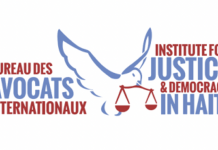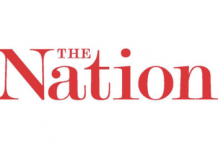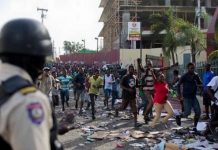by Kim Ives (Haiti Liberte)
On May 27,
lawyers representing thousands of Haitian cholera victims filed an appeal
against Federal Judge J. Paul Oetken’s Jan. 9, 2015 decision that the United
Nations is legally immune from prosecution for importing cholera into Haiti and
unleashing an epidemic which has killed about 9,000.
lawyers representing thousands of Haitian cholera victims filed an appeal
against Federal Judge J. Paul Oetken’s Jan. 9, 2015 decision that the United
Nations is legally immune from prosecution for importing cholera into Haiti and
unleashing an epidemic which has killed about 9,000.
Lawyers from the Boston-based
Institute for Justice and Democracy in Haiti (IJDH), the San Francisco-based
Center for Law and Global Justice, and the Miami-based firm of famed
immigration lawyer Ira Kurzban filed a 62-page brief which argued that Judge
Oetken erred in ruling that the UN and its military force, the UN Mission to
Stabilize Haiti (MINUSTAH), were immune “despite having violated their treaty
obligation to provide a mode to settle private law claims,” and UN Secretary
General Ban Ki-Moon and former MINUSTAH chief Edmond Mulet “are entitled to
immunity in this case simply because they ‘hold diplomatic positions.’” The
lawyers also argued that, by granting these immunities, Judge Oetken was
violating the plaintiffs’ “constitutional rights to access the federal courts.”
Institute for Justice and Democracy in Haiti (IJDH), the San Francisco-based
Center for Law and Global Justice, and the Miami-based firm of famed
immigration lawyer Ira Kurzban filed a 62-page brief which argued that Judge
Oetken erred in ruling that the UN and its military force, the UN Mission to
Stabilize Haiti (MINUSTAH), were immune “despite having violated their treaty
obligation to provide a mode to settle private law claims,” and UN Secretary
General Ban Ki-Moon and former MINUSTAH chief Edmond Mulet “are entitled to
immunity in this case simply because they ‘hold diplomatic positions.’” The
lawyers also argued that, by granting these immunities, Judge Oetken was
violating the plaintiffs’ “constitutional rights to access the federal courts.”
Cholera is a water-borne bacteria
which principally spreads via sewage. In October 2010, cholera-infected
Nepalese MINUSTAH soldiers allowed feces from their out-houses to flow into the
headwaters of Haiti’s largest river, the Artibonite, used for drinking,
washing, and irrigation. The disease rapidly spread throughout the country,
and, in the past five years, some 740,000 Haitians have been infected,
resulting in 8,927 fatalities as of the latest count in April 2015.
which principally spreads via sewage. In October 2010, cholera-infected
Nepalese MINUSTAH soldiers allowed feces from their out-houses to flow into the
headwaters of Haiti’s largest river, the Artibonite, used for drinking,
washing, and irrigation. The disease rapidly spread throughout the country,
and, in the past five years, some 740,000 Haitians have been infected,
resulting in 8,927 fatalities as of the latest count in April 2015.
“Rather than undertaking a bona fide
investigation and containing the disease, Defendants responded by covering up
key evidence and misleading the public about the UN and MINUSTAH’s
responsibility,” the lawyers wrote. “Despite clear knowledge of the substandard
sanitary conditions of the [Nepalese soldiers’] Meille base, Defendants
repeatedly denied any connection to the outbreak and refused to conduct, or to allow
others to conduct, a timely investigation. MINUSTAH also issued several
statements asserting that all Nepalese soldiers deployed to Haiti in October
2010 underwent medical testing and that none tested positive for cholera when,
in fact, no such tests were conducted.
Despite privately acknowledging that
investigation and containing the disease, Defendants responded by covering up
key evidence and misleading the public about the UN and MINUSTAH’s
responsibility,” the lawyers wrote. “Despite clear knowledge of the substandard
sanitary conditions of the [Nepalese soldiers’] Meille base, Defendants
repeatedly denied any connection to the outbreak and refused to conduct, or to allow
others to conduct, a timely investigation. MINUSTAH also issued several
statements asserting that all Nepalese soldiers deployed to Haiti in October
2010 underwent medical testing and that none tested positive for cholera when,
in fact, no such tests were conducted.
Despite privately acknowledging that
the statements
were false, Defendants never retracted them.”
were false, Defendants never retracted them.”
“That Defendants’ acts were the
direct and proximate cause of Haiti’s cholera
direct and proximate cause of Haiti’s cholera
epidemic is
indisputable,” the brief continues. “Since the outbreak, several independent
epidemiologists have conclusively established that the cholera in Haiti
originated from the UN
indisputable,” the brief continues. “Since the outbreak, several independent
epidemiologists have conclusively established that the cholera in Haiti
originated from the UN
base. Experts in genetic analysis have matched the
cholera strain in Haiti to the one in Nepal….
Despite this evidence, the UN continued to deny responsibility.”
cholera strain in Haiti to the one in Nepal….
Despite this evidence, the UN continued to deny responsibility.”
The lawyers first filed suit within
the UN’s grievance system on Nov. 3, 2011, but their petition was backhanded 15
months later in a two-page letter which said simply stated that the claims were
“not receivable.”
the UN’s grievance system on Nov. 3, 2011, but their petition was backhanded 15
months later in a two-page letter which said simply stated that the claims were
“not receivable.”
Unable to make a claim within the
UN’s framework, the lawyers had to resort to the U.S. court system. On Oct. 9,
2013, they filed a class-action lawsuit in U.S. District Court in New York
against the UN and its officials on behalf of five Haitian plaintiffs affected
by cholera and now living in New York State. They charged “common law
negligence, recklessness, wrongful death, negligent supervision, and negligent
infliction of emotional distress” and sought “remediation of Haiti’s waterways
and provision of sanitation infrastructure needed to control the continuing
epidemic, as well as damages for the deaths and injuries caused.”
UN’s framework, the lawyers had to resort to the U.S. court system. On Oct. 9,
2013, they filed a class-action lawsuit in U.S. District Court in New York
against the UN and its officials on behalf of five Haitian plaintiffs affected
by cholera and now living in New York State. They charged “common law
negligence, recklessness, wrongful death, negligent supervision, and negligent
infliction of emotional distress” and sought “remediation of Haiti’s waterways
and provision of sanitation infrastructure needed to control the continuing
epidemic, as well as damages for the deaths and injuries caused.”
The lawyers had great difficulty
serving papers on UN officials, who refused to receive the summonses. Judge
Oetken finally heard oral arguments in a packed court-room on Oct. 23, 2014.
The UN never showed up. Arguing for their immunity from the lawsuit were only
U.S. government lawyers.
serving papers on UN officials, who refused to receive the summonses. Judge
Oetken finally heard oral arguments in a packed court-room on Oct. 23, 2014.
The UN never showed up. Arguing for their immunity from the lawsuit were only
U.S. government lawyers.
The crux of this case is whether the
UN can invoke the Convention on the Privileges and Immunities of the United
Nations (CPIUN). “The UN and MINUSTAH cannot lawfully hide behind the CPIUN
when they refuse to comply with their obligations under that treaty,” the
lawyers argue in their appeal. “Their refusal to provide a claims commission or
other mechanism to address the claims of cholera victims violated Section
29″ of the CPIUN, which requires a way to make claims. The UN provides no
such avenue, but Judge Oetken found “the violation of Section 29 to be of no
consequence,” the lawyers pointed out.
UN can invoke the Convention on the Privileges and Immunities of the United
Nations (CPIUN). “The UN and MINUSTAH cannot lawfully hide behind the CPIUN
when they refuse to comply with their obligations under that treaty,” the
lawyers argue in their appeal. “Their refusal to provide a claims commission or
other mechanism to address the claims of cholera victims violated Section
29″ of the CPIUN, which requires a way to make claims. The UN provides no
such avenue, but Judge Oetken found “the violation of Section 29 to be of no
consequence,” the lawyers pointed out.
It may be months before the Appeals
Court acts. During that time, the cases of sickness and death from cholera in
Haiti will spike as they always do when rains drench the sanitation-challenged
nation during hurricane season, which has only just begun.
Court acts. During that time, the cases of sickness and death from cholera in
Haiti will spike as they always do when rains drench the sanitation-challenged
nation during hurricane season, which has only just begun.





